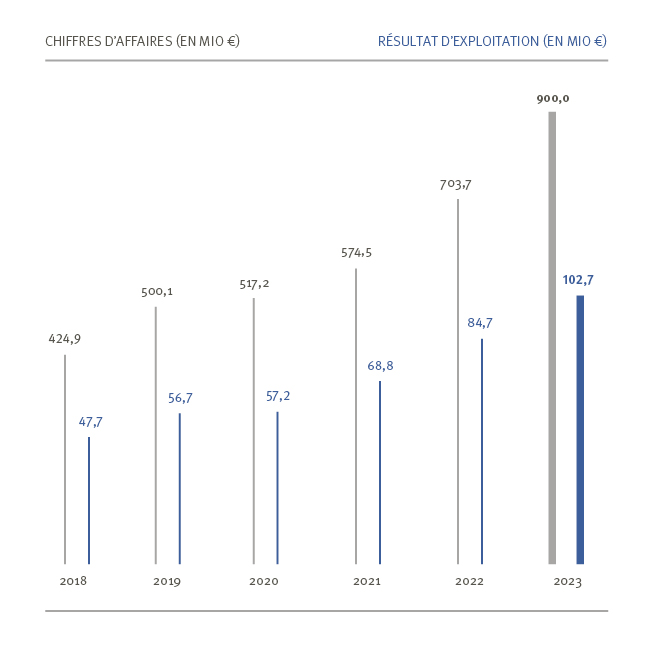Despite the difficult geopolitical and economic situation, Drees & Sommer SE maintained its growth trajectory in 2023. Sales of the Stuttgart-based consulting firm, which specializes in construction and real estate, increased to 900 million euros in 2023. The operating result stood at 102.7 million euros.
Steffen Szeidl, Member of the Executive Board of Drees & Sommer SE explained: “In previous years, we were already looking ahead and preparing ourselves for the changed market situation. That is why Drees & Sommer is today operating from a position of strength. We built up reserves at an early stage and geared our internal structures as well as new and innovative service ranges to the changed market requirements. Our high level of diversification and our streamlined business processes also give us a good degree of resilience. This allows us to continue operating actively in the market without having to react under pressure.”
“For instance, a newly initiated internal efficiency program has enabled staff to identify and realize potential at different levels, and this made a major contribution to the company’s good performance. We are following this approach in 2024 also, and are continuing to see positive results,” added Marc Schömbs, his colleague on the Executive Board.
High Demand in the High-Tech Sector
According to Drees & Sommer Executive Board Member Dierk Mutschler, the company has identified high demand in the high-tech industry, which will need a large number of factories and production facilities in the coming years. The chip industry is expected to see a particularly strong upturn, driven by relocations associated with deglobalization, capacity expansions, and the demand for new technologies. For example, where optimization was previously all about costs, industry is now creating more independent supply chains. As he asserted, this also has a positive impact on regional suppliers and their performance. Dierk Mutschler said: “With investments, we always bear in mind the environmental impacts as well as designing an efficient factory, so as to get the carbon dioxide emissions from industry under control. In this area we mainly rely on sector coupling as an effective key to decarbonization. Industry, mobility/transport, heating and electricity can no longer be viewed in isolation; all stakeholders have to enter into cross-sector partnerships to achieve the energy transition together.’´”
Strong Partnerships Instead of Solo Efforts
Several companies with strategically complementary services became part of the Drees & Sommer Group in 2023. One of these is project consulting firm cruh21, which specializes in hydrogen and is helping to shape the rapid transformation to a sustainable energy industry. Also on board is the architectural firm Unit4, a specialist in complex construction projects in the energy industry referred to above, that focuses on project management and construction advice services. m3 Bauprojektmanagement GmbH offers customized planning and design solutions to builder-owners and planners. In addition, Drees & Sommer holds a major shareholding in the scale-up company BABLE Smart Cities, with the aim of driving forward the field of digital and sustainable urban development. A strategic partnership exists with Adolf Würth GmbH & Co.KG for the operation of LCM Digital, a digital real-time platform for complex construction projects.
Outlook 2024: Positive Impact on the Built Environment
Member of the Executive Board Steffen Szeidl is thinking ahead: “Will 2024 be easier than 2023 from a business point of view? We do not think so. For this reason, we are continuing to work hard at building up and expanding services designed with the future in mind, as well entering into cross-sector partnerships. Our objective is always to play a part in shaping a sustainable future and achieving a positive, tangible impact on the built environment.” This can be achieved by actively implementing policies, concepts and solutions – such as serial retrofitting/energetic modernization, new technologies, artificial intelligence (AI) and digital platforms – which, for example, can act to boost the circular economy. However, policymakers must also get more involved, according to Steffen Szeidl: “To fast-track climate-friendly construction, we need the Type E building, as proposed by the German Association of Architects (BDA). The ‘E’ stands for ‘easy’ (simple) or ‘experimental’. At present, we work with time-consuming special permits in the case of these new structures. Building type E is exempt from the usual requirements as long as safety concerns such as fire prevention and the relevant environmental standards are met.”
For detailed information on our financial results and/or our flagship projects, please visit the link: Future Proofs - Driven by Dreso
